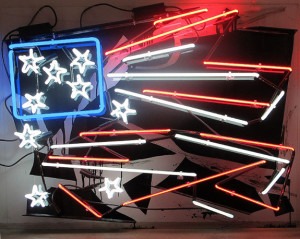A few days after I had turned seven I dashed into my family’s small living room as my dad was watching television. The scene wasn’t anything special because our living room was straight out of a Sandra Cisnero’s novel: the couches were covered in plastic, there were small glass figurines everywhere and a big wooden stand that housed our small television and many, many family photographs. Over a year earlier, Rodney King had been pulled over for driving recklessly on Interstate 210 in Los Angeles. When the police officers finally got King to slow down and pull over five white police officers were called in to subdue King. A man who lived in the area took the now infamous video of King being beaten half to death by several police officers while a few others stood by. The case was taken to court in Los Angeles, but was later moved to a county just north of the city, Ventura County, to pacify some of the outrage that was already felt on the streets. Four police officers were charged with using excessive force and an assault against King. On Wednesday April 29, 1992 the jury acquitted three of the four officers and charged only one with using excessive force. People were outraged…

By Thursday a curfew was put in place. My younger brother Miguel and I had gone to school that Thursday and it was just like any other day so when I got home I ran inside to ask my dad if I could play with my friends. Anyone who knows my dad knows that he doesn’t watch television just to watch it, he turns it on as background noise, loud annoying background noise. Yet I remember that on this particular Thursday afternoon my dad stood transfixed in front of the television screen stacked just north of a small glass deer we kept years after the riots. “Dad, puedo jugar afuera?” “Sí, ve.” He was short and stern so I knew something was wrong. We didn’t know the extent of the Rodney King situation until the next day.
My dad came home from work that Friday in a panic. His co-worker had warned him to go to the supermercado after work and buy water, bread, whatever he could find in case the riots didn’t end soon. My dad is an almost comically anxious man. Recently he almost had a panic attack when his iPhone mysteriously stopped “working” by not ringing anymore (upon further inspection, he had turned the ringer off accidentally by flipping the switch on the side of the phone). I mention this part to let the reader know how terrified he must have actually been during the four tumultuous days of the riots. Our family’s situation was not special because many minority groups were facing the same insecurities during the riots. My dad had to borrow forty dollars from that same co-worker because he did not have any money to buy the provisions we needed to get us through what at that time seemed like the beginning of an apocalypse.
That Friday my dad’s mission was to take my older brother to the store with him to buy provisions for the next few days. Unfortunately, the rioting had turned violent and looting started at the Mexican super market on the corner of Compton Boulevard and Atlantic Avenue. This was the store we went to buy everything: sweet breads, piñatas, carne asada, cowboy boot bling (because that’s what was cool in 1992) and you could even cash your checks or pay your utility bills at the store. This store really had it all. Well it did until the police officers were acquitted…
I read a lot of stories about the Los Angeles riots and many of them have similar narratives: minorities stood up against inequality and racism, fifty-five people died, over a 1,000 more were injured and many buildings were burned. There was a lot of destruction and loss of life during these four days and more qualified people have written about this event. This is not a historical story, but rather a specific retelling of my family’s story during the riots. There were people that probably took more than they needed during the looting, but if they were anything like my family, they were already living in a precarious situation during a period of civil unrest that government officials were slow to react to and people were eager to survive. This conversation could easily connect to the discourse of “us” (minorities) feeling disenfranchised by “them” (groups in power) that is often felt today with the way some police officers treat minority groups. We were just trying to survive.
My dad and brother came back from the store triumphant, but ashamed. I didn’t understand why at the time. They had come back with water, plenty of food and even a bag of plastic eggs that had little toys inside. I remember going to the store before the riots and putting a quarter in that machine. The mechanical chicken would bock bock, spin and then a colored plastic egg would roll down the vent. It was a magical machine. My dad said that someone had kicked in the glass cover off of the machine so that when he passed it by, he just had to collect some eggs for me. Perhaps my dad and brother were ashamed at not having paid for any of the items they brought back (there was no one there to pay), but I think they were mostly ashamed of how the store that we had come to enjoy so much was emptied of its beauty. They both came back distraught, but satisfied that we would be ok in an upheaval that arguably lasted two more days.
